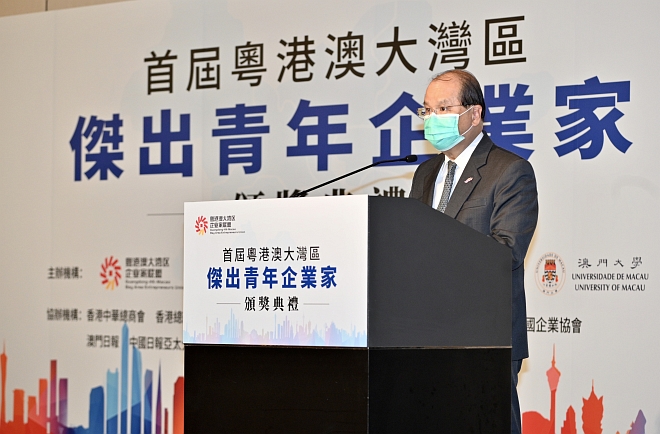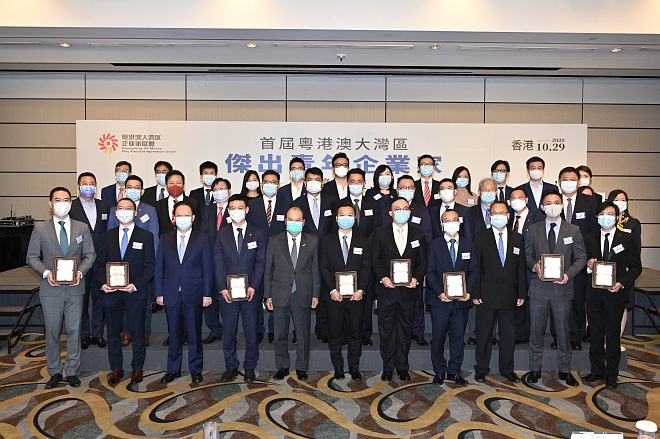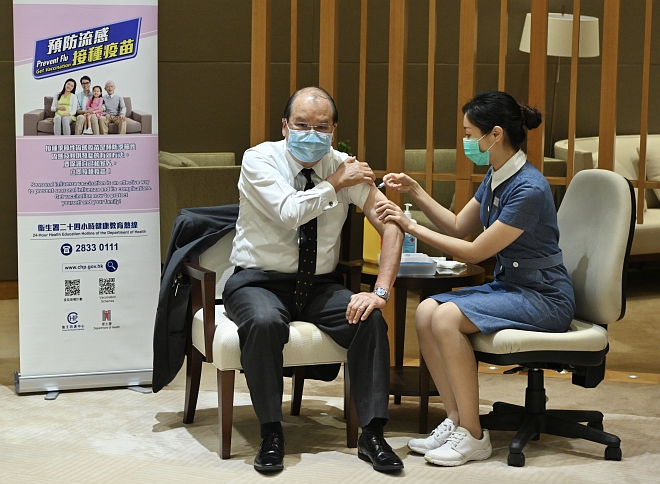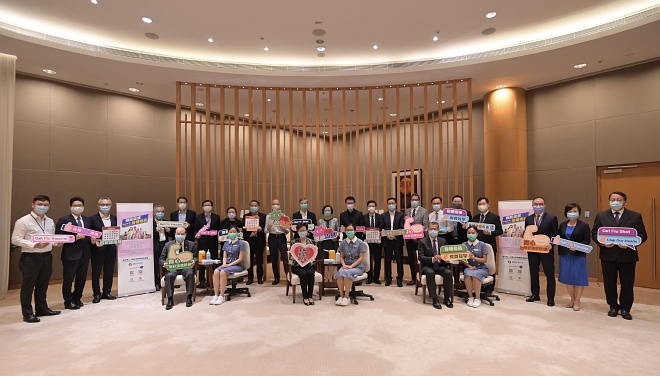Control the epidemic with precision and perseverance
Grasp opportunities for economic recovery
1 November 2020

|

|
It is understandable for members of the public to experience anti-epidemic fatigue after months of “hard-fought battle” against COVID-19. Even though the local epidemic situation has remained generally stable, there are still cases with unknown infection sources. The risk of virus transmission in the community must not be overlooked, and there is no room for substantial relaxation of social distancing measures for the time being. The Government is at this stage taking more precise prevention and control measures. While keeping the epidemic in check, a more focused approach is adopted to relax or adjust various social distancing measures in phases in a gradual and orderly manner, allowing social and economic activities to resume as far as possible under the new normal.
Members of the public should not let down their guard. They should maintain self-discipline by strictly complying with all anti-epidemic and social distancing measures and be mindful of epidemic prevention. Meanwhile, the Government will continue to step up patrols and prosecutions and carry out inter-departmental joint operations to ensure that people operating or working on premises and members of the public comply with relevant regulations.
LeaveHomeSafe - tapping technology to combat the pandemic
The Government is set to launch a COVID-19 exposure notification mobile app named “LeaveHomeSafe”, which will first be tried out in government venues and gradually be extended to cover more venues for enhancing the anti-epidemic work.
The development of the mobile app was led by the Office of the Government Chief Information Officer (OGCIO). It aims to encourage the public to keep a record of their whereabouts by electronic means, thereby enhancing the effectiveness of contact tracing by the Centre for Health Protection and supporting the anti-epidemic work with technology.
After downloading the free mobile app, members of the public may, when entering a participating venue, scan the QR code there to record their visit in the app on their mobile phones. If a confirmed case is later identified at a participating venue, the app will send a notification and health advice to users who have visited the same venue at around the same time as the confirmed patient to make them aware of the infection risk.
The Government understands that people care very much about their privacy. Use of the “LeaveHomeSafe” app is voluntary and visits are recorded at users' discretion. The records will be encrypted and stored only on users' mobile phones with no backups in government or any other systems. The OGCIO is working with various departments to actively introduce the app to various sectors such as eateries, karaokes, fitness centres and taxies to encourage wider participation.
Setting up testing centres
The Government has been adopting a multi-pronged approach in COVID-19 surveillance. This includes the provision of free testing service through public general out-patient clinics and private doctors for people who perceive themselves as having a higher risk of exposure and those who have experienced mild discomfort or developed symptoms. In light of the earlier small-scale local outbreaks, the Government set up temporary testing centres in districts with higher number of COVID-19 cases to provide free specimen collection and testing for the public, with a view to identifying COVID-19 patients and cutting the transmission chains in the community as early as possible.
To meet unexpected testing demand in a more efficient and flexible manner, the Government is planning to set up another four testing centres at Quarry Bay Community Hall in Eastern District, Henry G Leong Yaumatei Community Centre, Lek Yuen Community Hall in Sha Tin and Yuen Long Town East Community Hall. When the local epidemic situation stabilises, these centres will serve to provide self-paid testing services at a more affordable price to cater for such demand under the new normal. The community testing centres, to be operated by contractors' personnel, will run for an initial period of three months. The procurement of contractor service is underway with a view to commencing the operation in the soonest possible time.
Early influenza vaccination

|

|
As Hong Kong continues to face the challenge of COVID-19 pandemic, influenza viruses and the causative virus of COVID-19 may both spread in the coming winter influenza season. Members of the public should therefore receive seasonal influenza vaccination in advance to enhance personal protection and alleviate the burden on the healthcare system. This year's Government Vaccination Programme (GVP) and the Vaccination Subsidy Scheme (VSS) have kicked off. Eligible high-risk groups (including children, persons aged 50 or above as well as persons with long-term health problems) may receive free seasonal influenza vaccines (SIV) at designated public clinics in phases or subsidised vaccination at clinics of private doctors enrolled in the VSS.
As part of the Government's efforts to ensure a stable supply of SIV under various programmes, the Department of Health (DH) has procured a total of 878 000 doses of inactivated influenza vaccine for this year's vaccination programmes, including 628 000 doses for the GVP and 250 000 doses for the “Seasonal Influenza Vaccination School Outreach (Free of Charge) in Primary School”, to provide free vaccination to the eligible high-risk groups in phases.
Meanwhile, in view of the keen public demand for SIV, the Government will increase the overall supply. Special allocation arrangement will be made to provide an additional 100 000 doses of SIV in phases to the Public-Private-Partnership (PPP) Outreach Teams that provide vaccination for school children and to doctors enrolled in the VSS to facilitate vaccination for high-risk groups and help relieve the tight supply in the private healthcare sector.
Under the “Seasonal Influenza Vaccination School Outreach (Free of Charge)”, the Government will arrange the PPP Outreach Teams or DH's outreach teams to provide free vaccination for school children in participating schools. So far, around 450 primary schools and 760 kindergartens, kindergarten-cum-child care centres and child care centres have signed up for the programme, accounting for over 65% of all such institutions across the territory. The figures are encouraging and will hopefully result in a higher uptake rate among school children.
Opportunities for economic recovery
Hong Kong's overall economic performance, measured in terms of the real gross domestic product (GDP), saw some improvement in the third quarter, having hit bottom in the second quarter. According to advance estimates, GDP fell by 3.4% in real terms in the third quarter from a year earlier, visibly narrower than the 9.0% contraction in the second quarter. On a seasonally adjusted quarter-to-quarter comparison, the GDP rose notably by 3.0% in real terms in the third quarter, ending five consecutive quarters of contraction. The total exports of goods resumed growth in the third quarter thanks to the revived import demand of many major markets especially the Mainland. The continued solid recovery of the Mainland economy should render support to Hong Kong's exports in the coming few months.
Hong Kong and our motherland are closely linked with a shared future. Under the nation's 14th Five-year Plan, the Central Government will further support Hong Kong to consolidate and enhance its competitive edges by developing a high-quality Guangdong-Hong Kong-Macao Greater Bay Area (GBA) and building the city as an international innovation and technology hub. While our country is upholding the central role of innovation and technology in its modernisation drive, Hong Kong will have a bright future ahead as long as we capitalise on our unique position under “One Country, Two Systems” and tap new opportunities to fuse into the overall national development by exploring the best positioning and drawing up a new roadmap having regard to the nation's latest strategies.
One of the most pressing issues for Hong Kong is to revitalise the economy. The GBA will inject new impetus to our future economic development by providing momentous opportunities while fostering an enabling environment for our enterprises to enter its huge domestic market under its fast-track development on all fronts. With the GBA serving as a platform for a wide spectrum of business activities, our enterprises can play a pivotal role in the larger domestic circulation under a new development pattern of “dual circulation”, opening up a new chapter for our economic development. Leveraging on the complementary advantages of other cities in the GBA in matters of finance, innovation and technology, professional services, etc., Hong Kong will find vast development opportunities in the GBA.
Conclusion
Although the epidemic is easing in Hong Kong, the Government will not let the guard down or take the matter lightly. By drawing on the anti-epidemic experience gained over the past ten months and continuously seeking improvements, we have strengthened our capability in such areas as virus testing, quarantine facilities, treatment facilities and tracing of infection sources with the support of the Central Government and the combined efforts of our entire community.
I wish to emphasise that it is still not the time to heave a sigh of relief or feel complacent about our anti-epidemic work. The highly volatile epidemic situation calls for continued vigilance. Members of the public should exercise patience and persistence and work together to fight the epidemic by taking adequate infection control measures and maintaining personal and environmental hygiene. Only then can we win the “epidemic battle” and achieve early recovery of our economy.

